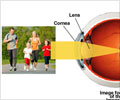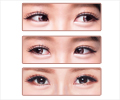You might be scolding your kid for putting studies at stake, courtesy long hours of out-of-doors activities, but as it turns out, outdoor games are good for children, at least as far
You might be scolding your kid for putting studies at stake, courtesy long hours of out-of-doors activities, but as it turns out, outdoor games are good for children, at least as far as their eyesight is concerned, says a new study.
Researchers in Australia have found an association between high levels of outdoor activity and low rates of short-sightedness, or myopia, in children.The prevalence of childhood myopia has increased dramatically in recent decades. With rates of 80percent in some East Asian populations, the search is on for possible causes.
"We know that there are genetic associations with myopia," New Scientist quoted Kathryn Rose of the University of Sydney in Australia, as saying.
"But the rapid changes in myopia prevalence are not consistent with a simple genetic determination, since gene pools do not change sufficiently fast," Rose added.
Suspecting that environmental factors might also be involved, Rose and colleagues set about investigating the effect that time spent outdoors has on the prevalence of myopia.
In the study, 2367 12-year-old Australian schoolchildren underwent eye examinations and completed questionnaires about their daily activities.
Advertisement
The children with the worst eyesight did lots of near work and spent very little time outside. Interestingly, the study found no benefit from playing sports indoors.
Advertisement
The researchers think the reason for this might be the light intensity children are exposed to outside. Rose explains that children's eyes grow as they get older but, for reasons not yet understood, the eyes of children who develop myopia grow excessively, leading to a mismatch between the optical power of the eye and its axial length.
The study has been published in Ophthalmology.
Source-ANI
SRM












